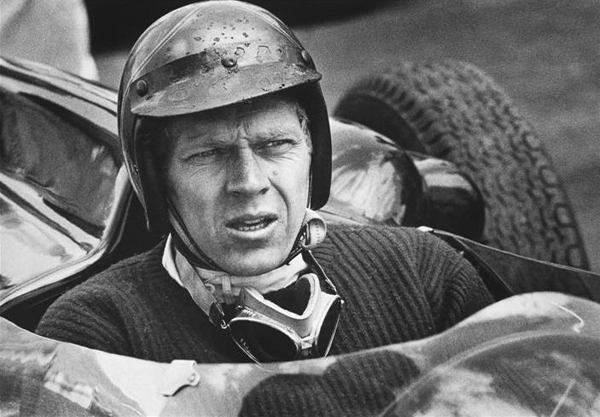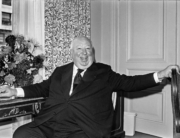In 1970, Steve McQueen was on top of the world as a box-office star, coming off of films like The Thomas Crown Affair and Bullitt. He was called the “King of Cool” (one of several nicknames you can see on his IMDb profile). So he decided to go for his longtime passion, auto racing, in particular in France at Le Mans. It’s a race that’s not really like the Indy 500: Le Mans is a 24-hour event, going on and on with drivers needing to keep up the pace for that entire time. McQueen wanted to capture that experience on film, and with his production company, Solar Productions, he made a deal and got a budget of $6 million to make his dream project. The production didn’t go well, to say the least, and it changed his life and career in a number of ways.
At first, Steve McQueen: The Man & Le Mans sounded like one of my favorite types of documentaries, movies about troubled productions or those that don’t even get finished (Hearts of Darkness: A Filmmaker’s Apocalypse, Lost in La Mancha, and, more recently, Jodorowsky’s Dune). These stories are immensely engaging, for a film buff and for someone interested in the creative process of making a movie. This documentary is instead really about McQueen, the star-actor as auteur and the world of racing and what attracted him to it.
The main goal for McQueen was simple: to film the experience of racing cars in a way the audience hadn’t seen before. In one of his audio interviews, which were uncovered by the filmmakers and restored to the best possible sound quality, he says he wanted to “break the film barrier” with Le Mans and to make the experience completely breathtaking, by putting multiple camera mounts on the cars, many of them driving at 200 MPH or more.
This wasn’t even the first race car movie. There’s an amusing anecdote about John Frankenheimer’s Grand Prix, starring James Garner, which beat Le Mans to theaters by five years, and how McQueen, feeling like his dream project got trampled on, did some nasty bit of business on neighbor Garner’s plants (urinating on them). But McQueen’s goal was to create the racing film, to make the audience feel the velocity and the “umbilical cord” attachment drivers have to their cars.
The strength of the documentary is the troubled side of the production, specifically the problems surrounding the script. McQueen, as star and executive, didn’t feel a completed script was necessary at the start. This fact seems to lurk over Steve McQueen until it gets addressed an hour or so in, and without a story, the production would be in serious trouble.
We see McQueen’s personal side, of course. He was a philanderer (it almost was a badge of honor for the dozen girls he’d bed a week to say they slept with him), and he got into a car accident with his assistant and his lead actress, Louis Edlind, that got swept under the rug just before the start of filming. There are clips of Roman Polanski, Sharon Tate, and Charles Manson—McQueen could have possibly been one of Manson’s victim, according to ex-wife Neile Adams McQueen. Some of this material could have easily been excised; it’s really just tangentially related to McQueen mindset at the time, and it takes away from the focus of the Le Mans production.
Le Mans was released in 1971 to mixed reviews. From the look of things, I almost thought at first the film was not ever finished, that it got abandoned midway through (a script did finally get knocked out, though the film was over budget and behind schedule). What’s most striking here is that the filmmakers capture McQueen’s falling out with racing. If he walked away for any reason from the sport it was probably from seeing driver David Piper’s accident during the filming of Le Mans; Piper lost a leg. Who cares about a story—albeit if there was a full script the accident might’ve been avoided—when someone’s life is on the line?
What one comes away with is that Steve McQueen could have been the best achievement for this star if it was more about the making of Le Mans, and I wish it wasn’t quite so repetitive about what racing meant to McQueen. Nevertheless, this is a unique take on the making-of-a-movie-gone-wrong story. It’s fascinating to see a Hollywood film go went awry in fundamental ways and how those in McQueen’s life, like the drivers and his son, Chad (who is an executive producer on this film), viewed him and his thirst for the ultimate race car movie.







Leave A Comment